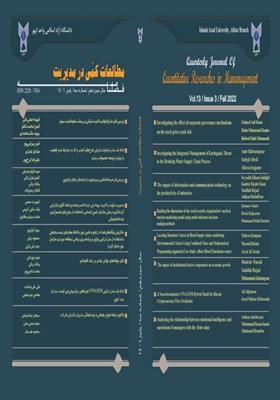تأثیر مولفههای عوامل نهادی بر رشد اقتصاد ی
محورهای موضوعی : مدیریتمنیره پورعلی 1 * , یداله رجایی 2 , محمد دالمن پور 3
1 - دانشجوی دکتری، گروه اقتصاد، واحد میانه، دانشگاه آزاد اسلامی، میانه، ایران.
2 - نویسنده مسئول، دانشیار، گروه اقتصاد، واحد زنجان، دانشگاه آزاد اسلامی، زنجان، ایران. آدرس پست الکترونیکی :
dr.yadollah.rajaei@gmail.
3 - دانشیار، گروه اقتصاد، واحد زنجان، دانشگاه آزاد اسلامی، زنجان، ایران.
کلید واژه: کلمات کلیدی: رشد اقتصادی, عوامل نهادی و پانل پویا,
چکیده مقاله :
چکیدهدر ا ین پژوهش، به بررسی تأثی ر مولفههای عوامل نهادی )حق اعتراض و پاس خگویی، ثبات سیاسی بدونخشونت، اثربخشی دولت، حاکمی ت قانون، کیفیت مقررات و کنترل فساد( بر رشد اقتصادی در 15 کشورمنتخب درحال توسعه طی دوره زمانی 2006 تا 2020 با استفاده از پانل پویا در قالب تکنیک اقتصادسنجیشده است. نتا یج برآوردها حاکی از آن است که، تمامی مولف ههای عوامل )GMM( گشتاورهای تعمی میافتهنهادی تأثیر مثبتی بر رشد اقتصادی دارند. بر این اساس، با بهبود و سپس با گسترش مولف ههای عوامل نهادی،میتوان در زمینه افزا یش رشد اقتصادی، نقش قابل توجهی را ا یفا کرد .کلمات کلیدی: رشد اقتصادی، عوامل نهادی و پانل پویا
AbstractIn this research, to investigate the effect of the components of institutional factors(voice and accountability, political stability and absence of violence, governmenteffectiveness, regulatory quality, rule of law and control of corruption) oneconomic growth in 15 selected developing countries during the period from 2006to 2020 using from the dynamic panel of Generalized Method of Moments(GMM) technique. The estimation results indicate that all the components ofinstitutional factors have a positive effect on economic growth. Based on this, byimproving and then expanding the components of institutional factors, it ispossible to play a significant role in increasing economic growth.
منابع
-شریف آزاده، محمدرضا و حسینی بحرینی، محمد. ) 1382 (. تأثیرپذیری سرمایهگذاری خصوصی در ایران ا ز
. 159-192 ، 1379 (. نامه مفید، 38 - شاخصهای امنیت اقتصادی ) 1358
-عیسی زاده، سعی د و احمدزاده، اکب ر ) 1388 (، بررسی اث ر عوامل نهادی ب ر رشد اقتصادی با تأکید ب ر نهادها ی
. 28-1 ، حاکمیتی، فصلنامه پژوهشهای اقتصادی ایران، 40
-مبارک، اصغر. ) 1389 (. اثر سرمای هگذاری در تحقیق و وتوسعه بر صادرات در ایران. فصلنامه تخصصی پار ک
. 39- 47 ، ها و مراکز رشد، 25
-مبارک، اصغر، هژبر کیانی، کامبیز، معمارنژاد، عباس و پیکارجو، کامبیز. ) 1397 (. مطالعه تاثیر کیفیت نهاد ی
. 146- 117 ، و سرمایه انسانی بر رشد اقتصادی. فصلنامه برنامهریزی و بودجه، 23
-Abdullahi, D. (2013). Effects of financial liberalization on financial market development
and economic performance of the SSA region: An empirical assessment. Economic
Modelling, 30, 261-273.
-Arellano, M., and Bond, S. R. (1991). Some Tests of Specification for Panel Data: Monte
Carlo Evidence and an Application to Employment Equations. Review of Economic
Studies, 58, 277-297.
-Baltagi, Badi H., (2013). Econometric Analysis of Panel Data. New York: John Wiley
and Sons.
-Eicher, T. & Schreiber, T. (2010). Structural policies and growth: Time series evidence
from a natural experiment. Journal of Development Economics, 91, 169–179.
-Greene, W. H. (2018). Econometric Analysis. New Jersey: Pearson Publication.
-Marija Radzeviča, A., & Bulderberga, K. (2018). The Role of Institutional Quality in
Economic Growth: Implications for the Baltic States. Bachelor Thesis.
-Matemilola, B. T., Bany-Ariffin, A. N., Azman-Saini, W. N.W., & Annuar, M. N.
(2019). Impact of institutional quality on the capital structure of firms in developing
Countries. Emerging Markets Review, 39, 175-209.
-Nusrate, A., & Ahmad, H. (2018). Institutions and Economic Growth: Does Income
Level Matter?. MPRA Paper, 83684, 1-34.
-Tavares J. (2009). Economic integration and the comovement of stock returns.
Economics Letters, 103, 65-67.
-World Bank. (2021). World Development Indicators. Retrieved from
http://www.worldbank.org/data/onlinedatabases.html.
-World Bank. (2021). The Worldwide Governance Indicators. Retrieved from
http://info.worldbank.org/governance/wgi/.
-Abdullahi, D. (2013). Effects of financial liberalization on financial market development
and economic performance of the SSA region: An empirical assessment. Economic
Modelling, 30, 261-273.
-Arellano, M., and Bond, S. R. (1991). Some Tests of Specification for Panel Data: Monte
Carlo Evidence and an Application to Employment Equations. Review of Economic
Studies, 58, 277-297.
-Baltagi, Badi H., (2013). Econometric Analysis of Panel Data. New York: John Wiley
and Sons.
-Eicher, T. & Schreiber, T. (2010). Structural policies and growth: Time series evidence
from a natural experiment. Journal of Development Economics, 91, 169–179.
-Greene, W. H. (2018). Econometric Analysis. New Jersey: Pearson Publication.
-Marija Radzeviča, A., & Bulderberga, K. (2018). The Role of Institutional Quality in
Economic Growth: Implications for the Baltic States. Bachelor Thesis.
-Matemilola, B. T., Bany-Ariffin, A. N., Azman-Saini, W. N.W., & Annuar, M. N.
(2019). Impact of institutional quality on the capital structure of firms in developing
Countries. Emerging Markets Review, 39, 175-209.
-Nusrate, A., & Ahmad, H. (2018). Institutions and Economic Growth: Does Income
Level Matter?. MPRA Paper, 83684, 1-34.
-Tavares J. (2009). Economic integration and the comovement of stock returns.
Economics Letters, 103, 65-67.
-World Bank. (2021). World Development Indicators. Retrieved from
http://www.worldbank.org/data/onlinedatabases.html.
-World Bank. (2021). The Worldwide Governance Indicators. Retrieved from
http://info.worldbank.org/governance/wgi/.

